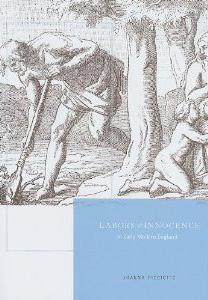Berkeley Books: Labors of Innocence in Early Modern England

In this month’s Berkeley Books selection, Labors of Innocence in Early Modern England, Associate Professor of English Joanna Picciotto argues that intellectual activity found new expression in the experimentalist sensitivity to perception and its re-imagination of the garden of Eden as the laboratory, Adam as its laborer. Translating Adam’s activities and Eve’s discovery in Eden as the work of experiment, Bacon’s “active philosophy” redeems curiosity from its association with original sin and gives epistemological authority to the innocence that prompts curiosity. This created a new ideal man – the dual figure of Adam as both a gardener, working the soil, and a scientist, giving name to each new discovery. Reinventing themselves through this ideal, the intellectuals of the age labored to participate in the collective production of truths. The thinker was the worker, Picciotto stresses, precisely because the seventeenth century understood the worker as a thinker.
The book is divided into two parts. The first part, “Contexts” unpacks the culture of curiosity through the re-readings of the genesis that were prevalent at the time, the corporate idiom of guilds and collective identity fostered by the Royal Society, the egalitarianism of the Diggers, and so on. “Texts” provides extensive readings of Davenant, Marvell, Dryden, a host of others and Milton above all to show how seventeenth-century authors appropriated the technologies of optics to reinvent mimesis, positioning themselves as interventionist spectators who served the public by making the physical phenomena “more visible.”
Picciotto’s claims have significant contemporary resonance. She presents us with an era that understood labor differently than its modern relegation into ceaseless production in the service of consumption. Her chronicle of mid-seventeenth century thinkers privileges the figure of Adam as a universally accessible ideal – in contradistinction with Habermas’ account of the public sphere as a bourgeois formation that takes no interest in theorizing the subject. Without insisting on its singularity, Picciotto identifies the aspiration behind experimentalist practice, the utopianism that tried to see the working life as reflective of the original state of creation rather than its fallen condition. Thus, while recognizing the historical impetus behind modern hermeneutics of suspicion, Picciotto nevertheless underscores the necessary fiction that shaped their collaborative public sphere. The book’s boldest suggestion, it thus seems, is an alternate conception of the instrumentality of labor and thought untethered from its oppressive associations in modernity.
Ayesha Ramachandran, in her review of Labors of Innocence in The Journal of Modern History, places Picciotto's "useful counternarrative" in the context of two critical debates: first concerning secularization in response to which "Picciotto shows convincingly that the (modern) idea of a public remained rooted in a vision of the Adamic corporate body, and not just in a sociopolitical desire for a secular space for debate;" and second concerning periodization to which Picciotto questions the barrier of 1660 and "seeks to recuperate the notion of a 'long seventeenth century' rather than a 'long eighteenth century,' now commonly projected backward to the Restoration."
Visit the Biblio-file to view books that shaped Professor Picciotto's thinking while working on Labors of Innocence.
Sookyoung Lee is a Graduate Student Researcher at the Townsend Center for the Humanities.